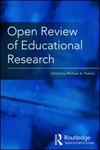Qatar’s educational reform past and future: challenges in teacher development
Q1 Arts and Humanities
引用次数: 70
Abstract
ABSTRACT Until the late 1990s, Qatar’s educational system used the intrinsic-nationalistic and cultural traditions of Arabic schools. The Qatari leadership and stakeholder was outdated; hence, they approached the RAND Corporation to examine and analyze the existing educational system and recommend options for building a new educational system. The RAND assessment study concluded that the country’s education system was rigid and lacked standards and international benchmarks. Consequently, this led to the reform in which a system of Independent Schools was established, new curriculum standards were set, and teacher and leadership professional development were enhanced to find the most effective systems for Qatari students to succeed along international and particularly Western benchmarks. The reform imputed by key principles of autonomy, accountability, variety and choice. Post-reform evaluation suggests that the system is still far from being what it should be. New teacher development initiatives have stressed on improving professional development for teachers through licensing and increased professional development programs. The present schooling is markedly different from what was presented in the reform. This article gives a brief historical preface of the educational system in Qatar and discusses the reform in terms of its future implications on teacher development in the K-12 educational system.卡塔尔教育改革的过去与未来:教师发展的挑战
直到20世纪90年代末,卡塔尔的教育系统一直沿用阿拉伯学校固有的民族主义和文化传统。卡塔尔的领导层和利益相关者已经过时;因此,他们找到了兰德公司,对现有的教育体系进行了调查和分析,并提出了建立新教育体系的方案。兰德公司的评估研究得出的结论是,该国的教育体系僵化,缺乏标准和国际基准。因此,这导致了独立学校体系建立的改革,新的课程标准制定,教师和领导专业发展得到加强,以找到最有效的系统,使卡塔尔学生能够在国际上特别是西方的基准上取得成功。改革的关键原则是自主、问责、多样化和选择。改革后的评估表明,该体系仍远未达到应有的水平。新的教师发展倡议强调通过颁发执照和增加专业发展计划来提高教师的专业发展。现在的学校教育与改革时的学校教育有很大的不同。本文简要介绍了卡塔尔教育制度的历史概况,并就改革对K-12教育制度教师发展的未来影响进行了讨论。
本文章由计算机程序翻译,如有差异,请以英文原文为准。
求助全文
约1分钟内获得全文
求助全文
来源期刊

Open Review of Educational Research
EDUCATION & EDUCATIONAL RESEARCH-
CiteScore
2.60
自引率
0.00%
发文量
0
审稿时长
22 weeks
 求助内容:
求助内容: 应助结果提醒方式:
应助结果提醒方式:


